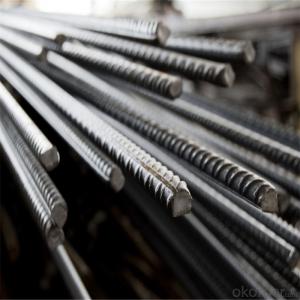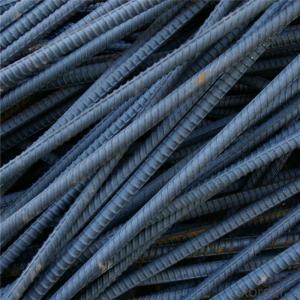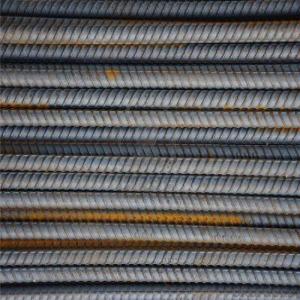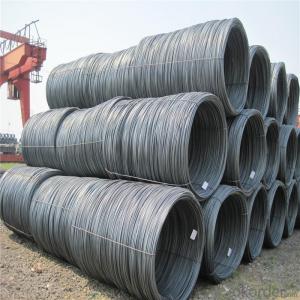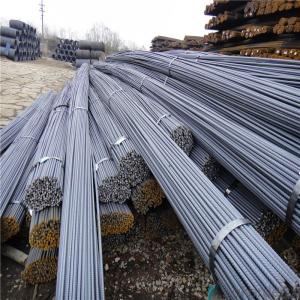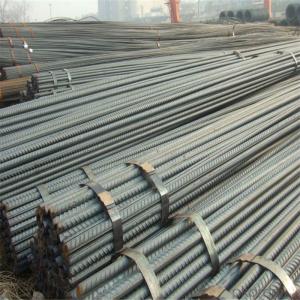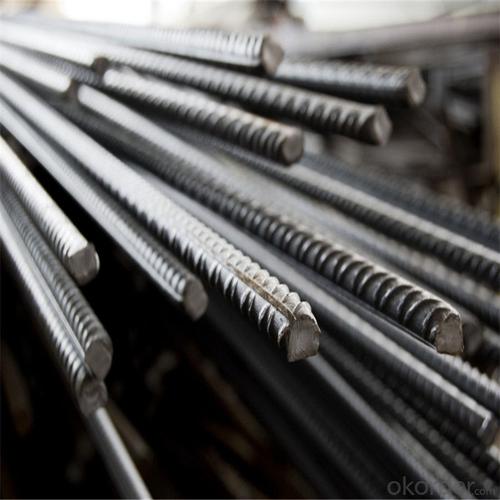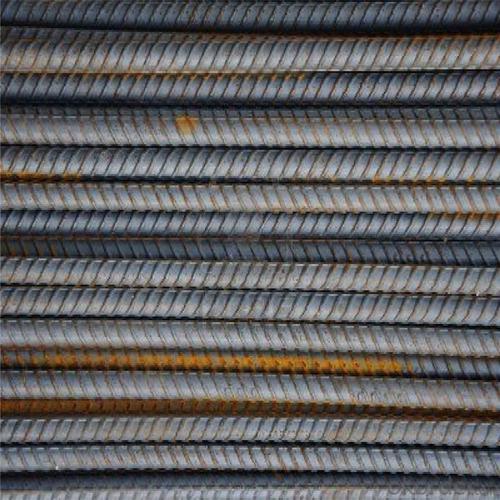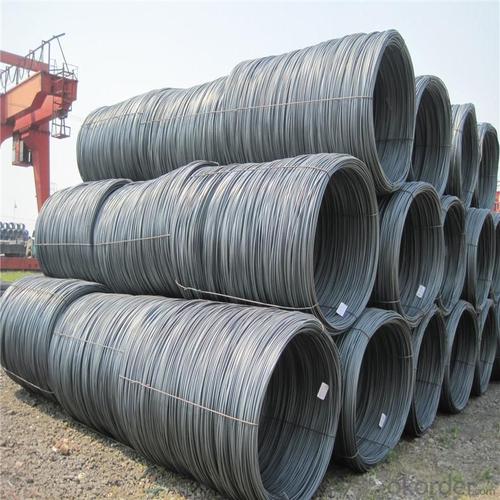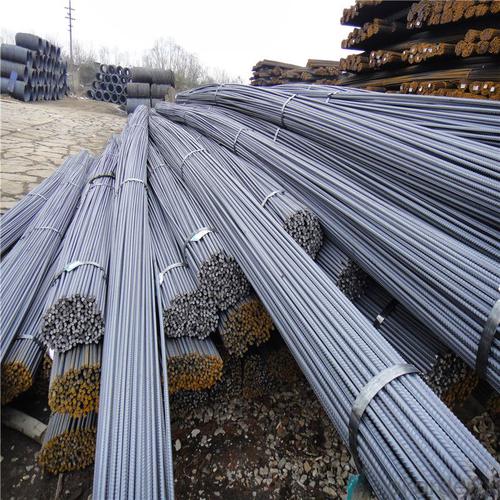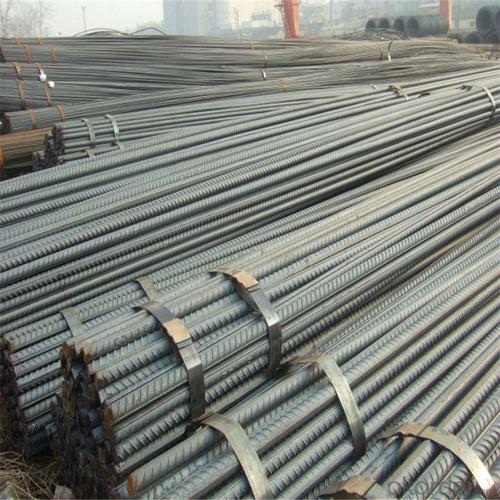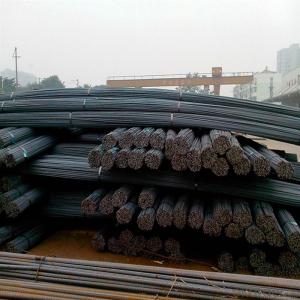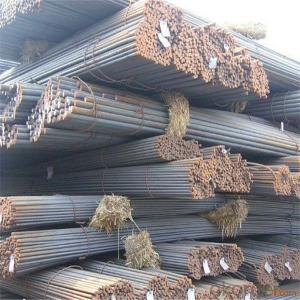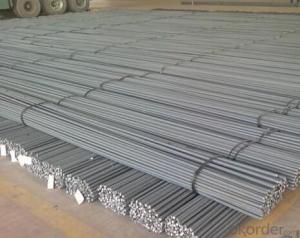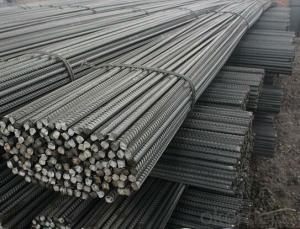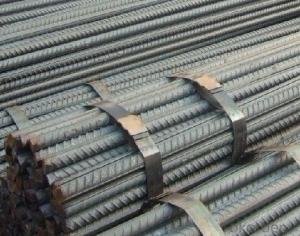16Mm Steel Rebar for Construction
- Loading Port:
- Tianjin
- Payment Terms:
- TT OR LC
- Min Order Qty:
- 150 m.t.
- Supply Capability:
- 400000 m.t./month
OKorder Service Pledge
OKorder Financial Service
You Might Also Like
Specification
16Mm Steel Rebar for Construction
Description of 16Mm Steel Rebar for Construction
1, Diameter: 5.5mm-10mm 16Mm Steel Rebar for Construction
10m- 40mm 16Mm Steel Rebar for Construction
2, Length: 6m, 9m, 12m or customized
3, Standard: GB, ASTM, AISI, SAE, DIN, JIS, EN
2, Produce Process: hot rolled or forged or cold rolled
3, Heat Treatment: annealing, normalizing, tempering, quenching
4, Surface Treatment: Black
5, Quality Assurance: We accept third party inspection for all orders.
Chemical Composition of 16Mm Steel Rebar for Construction
Grade | Technical data of the original chemical composition(%) | |||||
Reinforcing steel bar HRB335 | C | Mn | Si | S | P | B |
≤0.25 | ≤1.60 | ≤0.80 | ≤0.045 | ≤0.045 | >0.0008 | |
Physics Capability | ||||||
Yield Strength(N/cm2) | Tensile Strength(N/cm2) | Elongation(%) | ||||
≥ 335 | ≥490 | ≥16 | ||||
Reinforcing steel bar HRB400 | C | Mn | Si | S | P | B |
≤0.25 | ≤0.16 | ≤0.80 | ≤0.045 | ≤0.045 | 0.04-0.12 | |
Physics Capability | ||||||
Yield Strength(N/cm2) | Tensile Strength(N/cm2) | Elongation(%) | ||||
≥ 400 | ≥ 570 | ≥ 14 | ||||
Products Show of 16Mm Steel Rebar for Construction
Company Information
CNBM International Corporation is the most important trading platform of CNBM group.
Whith its advantages, CNBM International are mainly concentrate on Cement, Glass, Iron and Steel, Ceramics industries and devotes herself for supplying high qulity series of refractories as well as technical consultancies and logistics solutions.


F A Q
1, Your advantages?
professional products inquiry, products knowledge train (for agents), smooth goods delivery, excellent customer solution proposale
2, Test & Certificate?
SGS test is available, customer inspection before shipping is welcome, third party inspection is no problem
3, Factory or Trading Company?
CNBM is a trading company but we have so many protocol factories and CNBM works as a trading department of these factories. Also CNBM is the holding company of many factories.
4, Payment Terms?
30% TT as deposit and 70% before delivery.
Irrevocable L/C at sight.
5, Trading Terms?
EXW, FOB, CIF, FFR, CNF
6, After-sale Service?
CNBM provides the services and support you need for every step of our cooperation. We're the business partner you can trust.
For any problem, please kindly contact us at any your convenient time.
We'll reply you in our first priority within 24 hours.
- Q: Can special steel be used in the appliance manufacturing industry?
- Yes, special steel can be used in the appliance manufacturing industry. Special steels, such as stainless steel or high-strength steel, offer various advantages such as corrosion resistance, durability, and enhanced mechanical properties. These qualities make them suitable for manufacturing appliances that require high performance, such as refrigerators, ovens, or washing machines. Additionally, special steels can be customized to meet specific design requirements and can contribute to the overall aesthetic appeal of the appliances.
- Q: What are the main characteristics of electrical steel forgings?
- Electrical steel forgings possess several key characteristics that make them highly suitable for electrical applications. Firstly, electrical steel forgings exhibit low core loss, which refers to the amount of energy lost as heat during the magnetic cycle. This low core loss property makes electrical steel forgings ideal for transformers, motors, and generators, as it helps to enhance the overall efficiency and performance of these devices. Secondly, electrical steel forgings have high magnetic permeability, which means they can easily conduct magnetic flux. This characteristic allows for effective magnetic induction and helps to maximize the magnetic field strength in electrical components. As a result, electrical steel forgings enable efficient energy conversion and transmission. Additionally, electrical steel forgings exhibit low coercivity, meaning they require minimal magnetic field strength to magnetize and demagnetize. This property allows for faster and more precise magnetic switching in electrical devices, leading to improved performance and reduced energy losses. Furthermore, electrical steel forgings possess high electrical resistivity, which helps to minimize the flow of electrical current and reduce energy losses due to eddy currents. This characteristic is crucial in applications where electrical steel forgings are subjected to rapidly changing magnetic fields, such as power transformers. Lastly, electrical steel forgings are often treated with surface insulation coatings or coatings with high electrical resistivity to further enhance their electrical performance and prevent any short circuits or electrical leakage. In summary, the main characteristics of electrical steel forgings include low core loss, high magnetic permeability, low coercivity, high electrical resistivity, and the ability to be coated for insulation. These properties make electrical steel forgings essential for various electrical applications, ensuring efficient energy conversion, reduced losses, and reliable performance.
- Q: What are the future prospects for the special steel industry?
- The future prospects for the special steel industry are promising. With advancements in technology, increasing demand for high-performance materials in various sectors such as automotive, aerospace, and construction, the special steel industry is expected to witness steady growth. Additionally, the shift towards sustainable and lightweight materials in industries like renewable energy and electric vehicles presents new opportunities for the special steel industry. However, the industry may face challenges in terms of environmental regulations and competition from alternative materials. Overall, the future outlook for the special steel industry looks favorable, driven by technological advancements and evolving market demands.
- Q: What are the main advantages of using special steel in the oil and gas industry?
- The main advantages of using special steel in the oil and gas industry include its high strength, corrosion resistance, and ability to withstand extreme temperatures and pressures. Special steel is specifically designed and manufactured to meet the demanding requirements of the industry, ensuring reliable performance and longevity. It also offers excellent weldability, which is crucial for constructing pipelines and equipment used in oil and gas operations. Additionally, special steel's durability and resistance to fatigue make it ideal for withstanding the harsh conditions and environments encountered in the oil and gas sector.
- Q: What are the different surface finishing techniques for special steel parts?
- Special steel parts can undergo various surface finishing techniques to enhance their appearance, protect against corrosion, and improve overall performance. Some commonly utilized methods include: 1. Achieving a smooth and glossy surface on the steel part through polishing, using abrasives. This technique not only enhances aesthetics but also enhances resistance against corrosion. 2. Plating involves depositing a layer of metal onto the steel part's surface, with options such as chrome, nickel, and zinc. This technique provides additional protection against corrosion, improves wear resistance, and can offer desired color or finish. 3. Powder coating entails electrostatically applying a dry powder to the steel part's surface, followed by heat curing. The melted powder forms a durable and visually appealing coating that provides excellent resistance against corrosion, impact, and chemicals. 4. Anodizing, primarily used for aluminum but applicable to certain special steel parts, creates a controlled oxide layer on the surface. This enhances corrosion resistance, improves appearance, and can even provide insulation. 5. Employing a chemical process known as passivation removes free iron and contaminants from the steel part's surface. This process helps prevent corrosion and enhances resistance against staining or discoloration. 6. Heat treatment involves altering the physical and mechanical properties of the steel part by subjecting it to heating and cooling. This process improves hardness, strength, toughness, and provides desired surface finishes. 7. Through electropolishing, an electrochemical process, a thin layer of metal is removed from the steel part's surface. This technique eliminates surface imperfections, smoothens the part, and enhances corrosion resistance. Choosing the appropriate surface finishing technique is crucial, taking into consideration the specific requirements of the special steel part, including its function, desired appearance, and the environmental conditions it will encounter.
- Q: How does special steel perform in corrosive chemical environments?
- Special steel, also known as stainless steel, performs exceptionally well in corrosive chemical environments. This is primarily due to its unique composition which includes a high amount of chromium, typically above 10.5%. Chromium forms a passive oxide layer on the surface of the steel, which acts as a protective barrier against corrosion. The passive oxide layer is highly resistant to attack from various corrosive substances, including acids, alkalis, and salts. This makes special steel highly reliable and durable in chemical environments where corrosion is a significant concern. Additionally, special steel exhibits excellent resistance to pitting corrosion, which is a localized form of corrosion that can occur in aggressive chemical environments. This resistance is attributed to the presence of other alloying elements such as nickel and molybdenum, which further enhance the steel's corrosion resistance properties. Furthermore, special steel offers excellent strength and toughness, making it suitable for various industrial applications, including chemical processing plants, oil and gas refineries, and pharmaceutical industries. It can withstand high temperatures and pressures, ensuring long-term performance and reliability even in harsh chemical environments. However, it is essential to note that the performance of special steel in corrosive chemical environments can vary depending on the specific grade and composition of the steel. It is crucial to select the appropriate grade of special steel that is specifically designed for the intended chemical environment to ensure optimal performance and longevity.
- Q: How does special steel contribute to the tool manufacturing industry?
- Special steel plays a crucial role in the tool manufacturing industry by providing enhanced strength, durability, and wear resistance to tools. This type of steel is specifically designed to withstand extreme conditions and heavy usage, allowing tools to perform efficiently and last longer. With its unique properties, special steel enables the production of high-quality, precision tools that can handle demanding tasks in various industries, ultimately enhancing productivity and ensuring safety for workers.
- Q: What are the requirements for special steel used in metalworking tools?
- To ensure the effectiveness and durability of metalworking tools, specific characteristics and qualities are necessary for the special steels used in their production. Key requirements for these steels include: 1. High hardness: The special steels must possess a high level of hardness to resist wear and deformation, enabling the tools to maintain their sharpness and cutting edge for extended periods. This results in efficient and precise machining operations. 2. Excellent toughness: Given the high impact and stress loads experienced by metalworking tools, they must have excellent toughness to withstand the forces encountered during cutting, drilling, or shaping operations. This toughness prevents the tools from fracturing or chipping, ensuring a longer tool life. 3. Good heat resistance: The performance of metalworking tools can be compromised by the significant heat generated during the machining process. Therefore, the special steels used in these tools should exhibit good heat resistance to minimize the risk of thermal damage, even at elevated temperatures. 4. Wear resistance: Metalworking tools are constantly in contact with the workpiece, making the ability to resist wear crucial. Special steels used in these tools should have high wear resistance to maintain their cutting performance and dimensional accuracy over time. 5. Corrosion resistance: Metalworking tools often encounter harsh environments with coolants, lubricants, and corrosive elements. To prevent rusting and degradation, the special steels used in these tools should possess good corrosion resistance, ensuring the longevity and reliability of the tools. 6. High dimensional stability: Special steels used in metalworking tools must exhibit high dimensional stability to guarantee consistent performance. This stability allows the tools to maintain their shape and size under varying operating conditions, resulting in accurate and repeatable machining processes. 7. Machinability: The special steels used in metalworking tools should be easily processed and shaped into the desired tool design. This characteristic enables cost-effective manufacturing, reducing production time and expenses. By meeting these requirements, the special steels used in metalworking tools can withstand the demanding conditions encountered in various metal fabrication and machining operations. They provide efficient cutting, shaping, and drilling capabilities while maintaining longevity and performance.
- Q: How does special steel perform in construction applications?
- With its exceptional properties and performance characteristics, special steel, also known as alloy steel, plays a vital role in construction applications. Its enhanced strength, durability, and resistance to environmental factors make it highly suitable for demanding projects. A major advantage of special steel in construction is its high strength-to-weight ratio. This means it can handle heavy loads and pressures while remaining relatively lightweight, allowing for more efficient and cost-effective designs. Additionally, special steel has excellent fracture toughness, ensuring that structures built with this material can withstand significant impacts and vibrations without failure. Another significant benefit is its exceptional corrosion resistance. Construction projects often face exposure to harsh weather conditions, chemicals, and moisture, which can cause rusting and deterioration of traditional steel. However, special steel contains elements like chromium, nickel, and molybdenum, which provide excellent resistance to corrosion and oxidation, ensuring the longevity and durability of structures. Furthermore, special steel offers excellent weldability, enabling the efficient and secure joining of various components during construction. This allows for the fabrication of complex structures while maintaining their integrity and strength. In addition to its mechanical properties, special steel can provide additional benefits in construction applications. For instance, certain types of special steel possess excellent fire resistance, making them ideal for constructing fire-resistant structures or components. Additionally, some types of special steel offer enhanced electrical conductivity, making them suitable for applications that require efficient transmission of electricity. Overall, special steel's superior strength, durability, corrosion resistance, weldability, and additional properties make it an excellent choice for a wide range of construction applications. Whether it's high-rise buildings, bridges, infrastructure, offshore structures, or industrial facilities, special steel ensures the construction of safe, reliable, and long-lasting structures in challenging environments.
- Q: How does special steel contribute to the aviation industry?
- Special steel contributes to the aviation industry by providing essential materials that are durable, lightweight, and resistant to extreme temperatures and pressure. It is used for manufacturing critical components such as engine parts, landing gear, turbine blades, and structural components, ensuring the reliability and safety of aircraft. Additionally, special steel's high strength-to-weight ratio allows for improved fuel efficiency, reducing operational costs and environmental impact.
Send your message to us
16Mm Steel Rebar for Construction
- Loading Port:
- Tianjin
- Payment Terms:
- TT OR LC
- Min Order Qty:
- 150 m.t.
- Supply Capability:
- 400000 m.t./month
OKorder Service Pledge
OKorder Financial Service
Similar products
Hot products
Hot Searches
Related keywords
